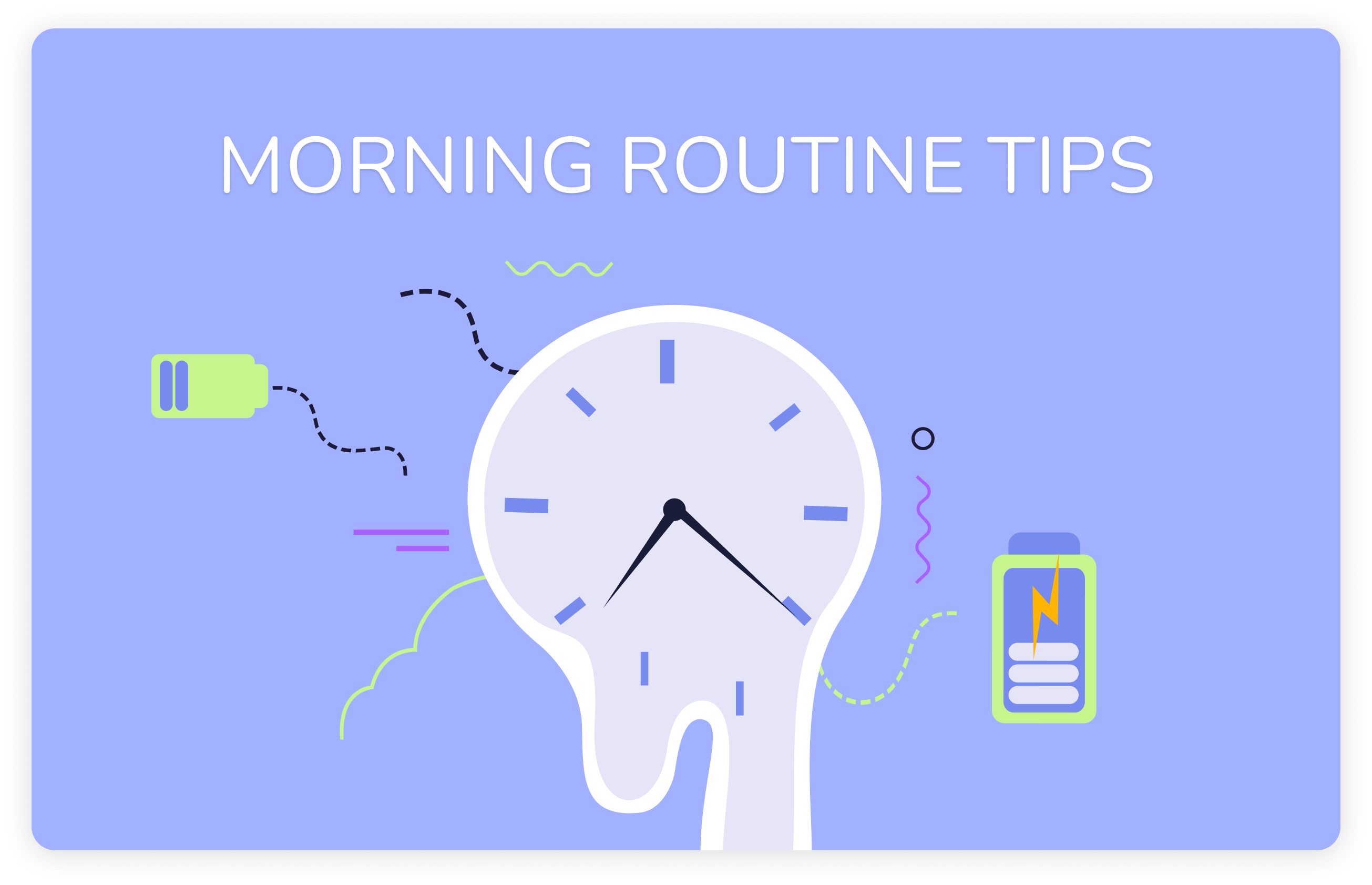The morning hours set the tone for the entire day. How you spend the first few minutes after waking up determines your energy level, productivity, and overall well-being for the entire day.
Research shows that people with a structured morning routine demonstrate significantly higher productivity and lower stress levels throughout the day. According to CNBC, a consistent morning routine can reduce stress, increase energy levels, and improve productivity at work.
In this article, we will look at 5 proven steps for creating the perfect morning routine using modern planning tools and AI.
1. High-resource awakening: avoid the snooze button.
.webp)
The first few minutes after waking up are critical for setting the mood for the entire day. When you press snooze, something interesting happens from a neurobiological perspective: the brain perceives this as a signal that important decisions can be postponed. This pattern of “procrastination” literally programs your nervous system to procrastinate throughout the day.
“To maintain your energy throughout the workday and prevent burnout, see our practical tips on boosting energy and reducing anxiety.”
A study by the University of Notre Dame, published in the journal SLEEP, shows that 57% of people are habitual snoozers. An extra 9-15 minutes of sleep after the first alarm does not provide any restorative benefits. On the contrary, you enter a new phase of slow-wave sleep, from which waking up becomes even more painful.
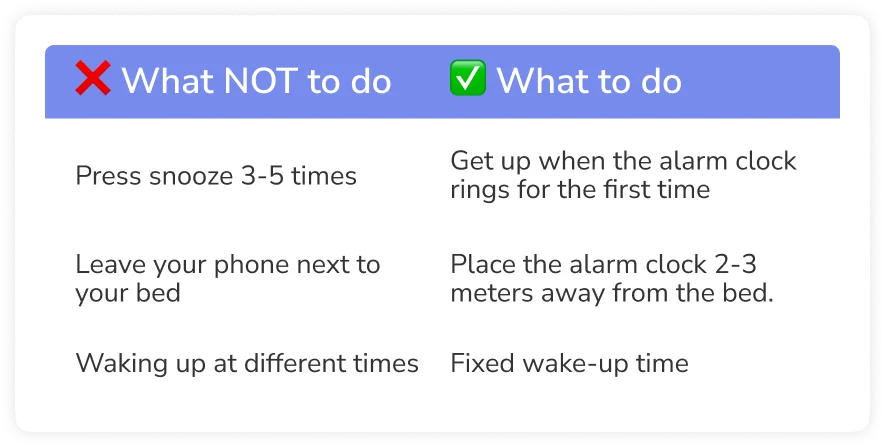
Hydration first
After 6-8 hours of sleep, the body is dehydrated by 1-2%. This may seem insignificant, but even such a small amount of dehydration reduces cognitive function by 12-15%. Your brain is 75% water, and it is the first to suffer from a lack of it.
Interesting fact: adding a pinch of sea salt or a few drops of lemon juice to water will speed up the rehydration process thanks to electrolytes. Research by the Harvard School of Public Health confirms that even mild dehydration can cause fatigue, confusion, and short-term memory loss.
Morning hydration routine:
🕐 0 minutes: Wake up
🕐 1-2 minutes: 250-300 ml of room temperature water
🕐 15-20 minutes: You can drink coffee/tea
🕐 30 minutes: Another 200 ml of water before breakfast
Switching on the light and easy charging
Bright light suppresses melatonin production and activates cortisol for natural awakening.
In winter, when there is not enough natural light, it is especially important to compensate for this with artificial lighting. Some studies show that light therapy can be as effective as caffeine in combating morning lethargy, but without the side effects.
5-minute activation plan:
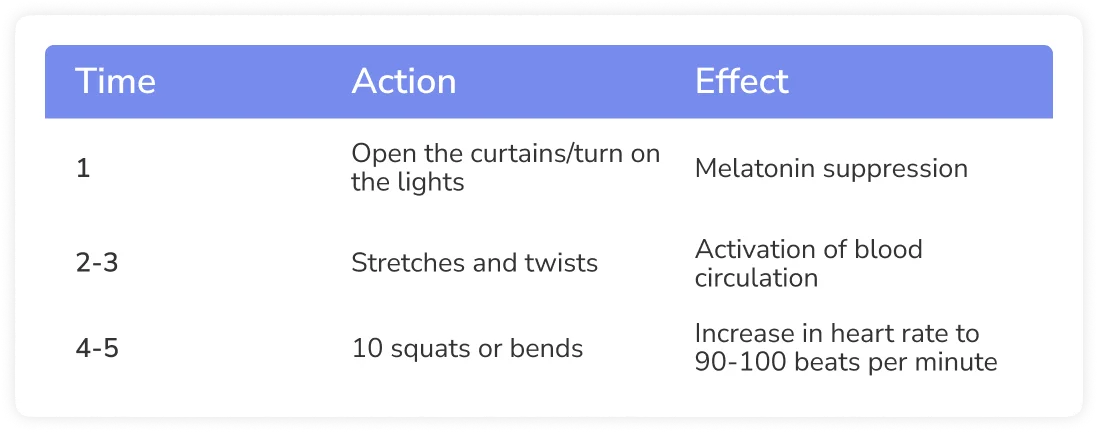
2. Morning “Magic Hours” for focus and tasks: set aside 2-2.5 hours for the most important tasks.
The concept of “magic hours” is based on chronobiological research, which shows that our brain works like a well-tuned instrument with predictable peaks of activity. In the first 150 minutes after waking up, cortisol levels reach optimal values — not too low (as in the evening), but not critically high (as in stressful situations).
It is during this period that the prefrontal cortex of the brain, which is responsible for decision-making, planning, and creative thinking, functions at maximum capacity. The neurotransmitters dopamine and norepinephrine are in perfect balance for concentration.
"This concept is based on principles detailed in our comprehensive guide to the 7 rules of the 5 AM Club for transforming your work-life balance."
According to a study by NAMI, a morning routine increases energy, productivity, and positivity, creating momentum for the brain's peak time for cognitive work (late morning).
Cognitive activity schedule:
.webp)
Optimal tasks for Magic Hours:
Three priority goals for the day
The “3 main tasks” rule is based on productivity research: people who choose a maximum of 3 priorities complete 64% more important tasks.
Priority matrix:
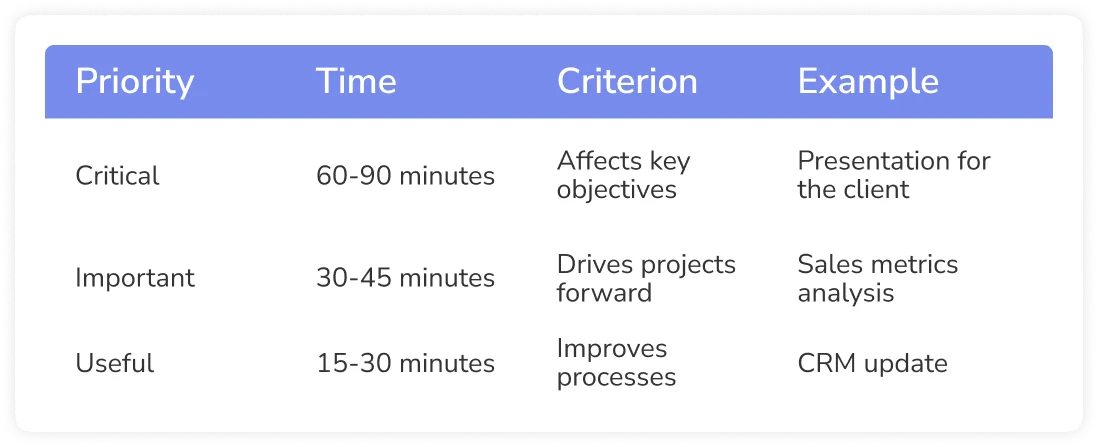
3. Rituals for state and mood: meditation, breathing, affirmations
Brain neuroplasticity—its ability to change and adapt—is most active in the morning. That is why morning mindfulness practices have such a powerful effect on the entire day. Just 5–10 minutes of meditation triggers changes in the prefrontal cortex that last for 6–8 hours.
Breathing exercises work by stimulating the vagus nerve — the longest nerve in the body, which connects the brain to the major organs. The 4-7-8 technique, for example, activates the parasympathetic nervous system, which naturally reduces stress levels and improves concentration.
Research shows that creative activities in the morning are associated with a reduction in symptoms of depression and an increase in serotonin levels, which promotes divergent thinking and emotional regulation.
3 quick techniques (choose one for yourself):
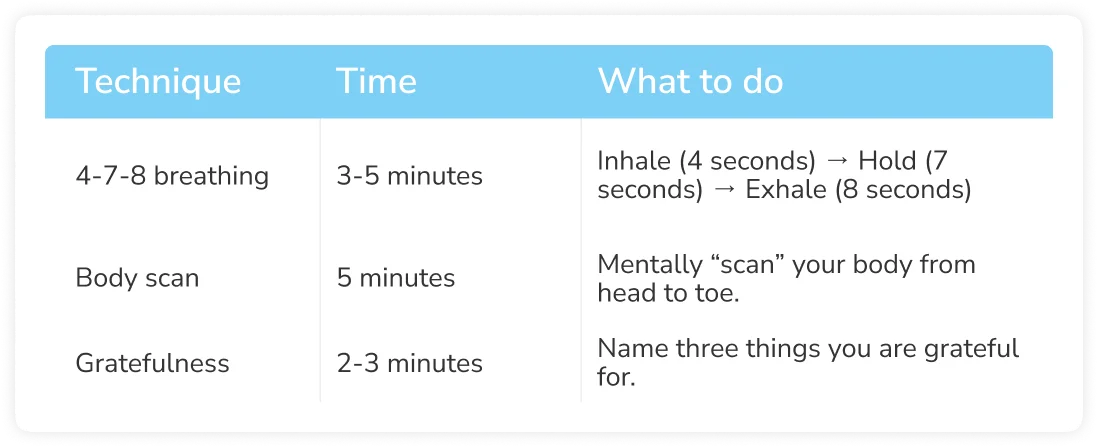
A light, healthy breakfast
A balanced breakfast stabilizes glucose levels and supports cognitive function for 4-6 hours.
Your brain consumes about 20% of your body's total energy, and after fasting overnight, its “fuel tanks” are practically empty. Glucose is the main “fuel” for neurons, but it is important to understand the difference between fast and slow carbohydrates.
Sweet baked goods or fruit juices cause a sharp spike in blood sugar, which is inevitably followed by a crash — that's why you feel tired and irritable an hour after a sweet breakfast. A balanced breakfast with protein, healthy fats, and complex carbohydrates provides stable glucose levels for 4-6 hours.
The formula for the perfect breakfast:
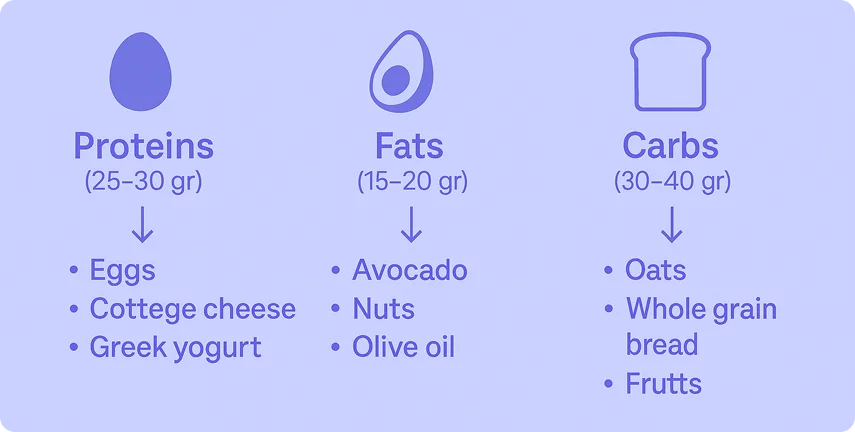
4. 5-minute daily planning with the tool: planning with the smart task manager
People who capture their plans in the morning complete 33% more tasks. AI planners increase efficiency by another 15%.
Voice planning saves minutes each morning - see how to manage your tasks with Voiset for step-by-step guidance, when the brain is not yet burdened with a multitude of decisions. You can freely express your thoughts without being distracted by the technical aspects of text input, and AI turns your spontaneous ideas into a structured system of actions.
Advantages of the AI morning routine app:
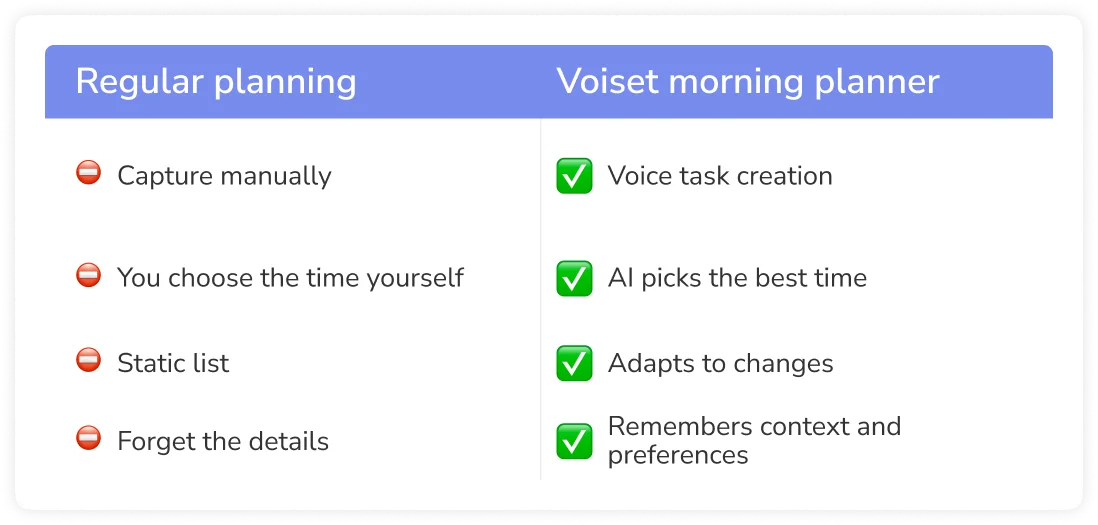
Examples of voice planning
Ask Voiset:
“Remind me to call the client tomorrow at 10 a.m.”
“Set aside 30 minutes for reading after lunch.”
“Add a meeting with the team on Tuesday.”
5. Flexibility when routines are disrupted
Perfectionism is the main enemy of sustainable habits. Research shows surprising statistics: 92% of people who set New Year's resolutions do not achieve them by the end of the year. The main reason is a lack of flexibility in the system.
Life is unpredictable by nature. Illness, urgent matters, family circumstances — all of these can disrupt your ideal morning routine. The key to long-term success lies not in rigidly following a plan, but in the ability to adapt while maintaining the basic principles.
Psychologists call this “implementation intentions” — pre-planned strategies for various scenarios. When you have a ready “plan B” for each habit, you avoid the “all or nothing” effect that destroys motivation. Research by Peter Gollwitzer shows that people with flexible strategies for achieving goals are 300% more likely to maintain new habits for longer than three months.
Adaptability above all else.
Practical adaptation strategies
Scenario 1: Overslept by 30 minutes
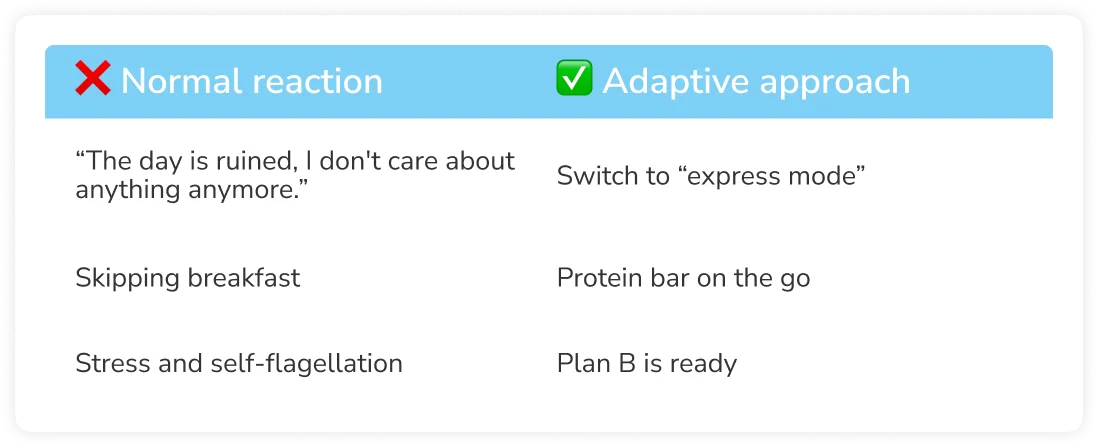
Express morning (15 minutes):
🕐 0 min: Water (30 sec) + contrast shower (3 min)
🕐 4 min: Write down 3 priorities on your phone (1 min)
🕐 5 min: Healthy snack on the go (2 min)
🕐 7 min: 3 deep breaths + positive mindset (1 min)
🕐 8 min: Leave the house with a clear plan for the day
Scenario 2: Illness or feeling unwell
We are not canceling our routine — we are adapting it to the current situation:
The psychology of flexibility:
How Voiset improves your morning routine
.webp)
Modern AI technologies greatly simplify the process of creating and maintaining a morning routine. Voiset morning planner uses voice control and AI to turn a chaotic morning into a structured productivity system.
1. Use Voice input for creating and modifying tasks
Forget about having to manually enter each task. Just speak, and Voiset will automatically:
Voice scheduling saves an average of 7-10 minutes in the morning, which can be spent on more important activities.
2. AI Notes for habits and automatic planning
One of Voiset's most innovative features is its ability to transform chaotic voice memos into a structured system of habits. AI Notes analyzes your spontaneous thoughts and automatically creates actionable plans.
How it works:
- Turns fleeting ideas into concrete actions
- Takes your current schedule into account when introducing new habits
- Offers realistic timeframes based on scientific data about habit formation
- Automatically adjusts plans when circumstances change
The result: instead of forgotten intentions, you get a structured system that naturally integrates into your morning routine.
A morning productivity routine is not a luxury reserved for successful people.
This is an accessible tool for anyone who wants to improve their quality of life. The key steps we have covered are:
Start today. Don't wait for Monday or the new month.
Choose 2-3 habits from this article and implement them tomorrow morning. Use the Voiset morning planner to turn voice commands into a structured schedule and establish your best morning routine.
Remember: every morning is a new opportunity to become the best version of yourself. Take the first step right now.

